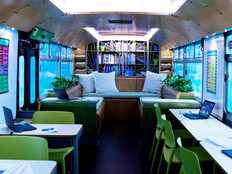Data Democracy: City-Sponsored Wi-Fi Is Growing in Speed and Popularity [#Infographic]
As they pursue municipal wireless networks, more cities are offering Wi-Fi to residents. A number of cities already have completed projects like this, typically by deploying mesh networks, which rely on a series of nodes to relay the signal. Access points are being installed on light poles in San Jose, Calif., and in telephone booths in New York City.
If most citizens already have Internet access at home, and many have broadband connections on their smartphones or tablets, why should cities provide wireless coverage? This very question, with a focus on parks, was posed on Quora and was answered articulately by Sebastian Tonkin, CEO of Cloud Nine Media:
There's an argument to be made here for data democracy as well. Every citizen of the city should be able to access the web. One easy way to ensure that is to make free access available in the places where people congregate.
Cities invest in parks to keep their citizens happy and healthy, and to give them a place to reflect, exercise and relax. I'd say the top reason to offer free WiFi in parks is that it meets a really important need for visitors, the need to be able to enjoy an ebook, listen to streaming music and generally take advantage of the benefits of cloud-based content and services. In other words, deploying WiFi is a great way for the parks department to keep their visitors happy and coming back.
Read Why should Wi-Fi be free in parks and other public spaces? on Quora.
As wireless networks expand, cities are becoming more involved in the deployment and maintenance of those systems. Here are a few numbers representing the growing trends in wireless networks:









